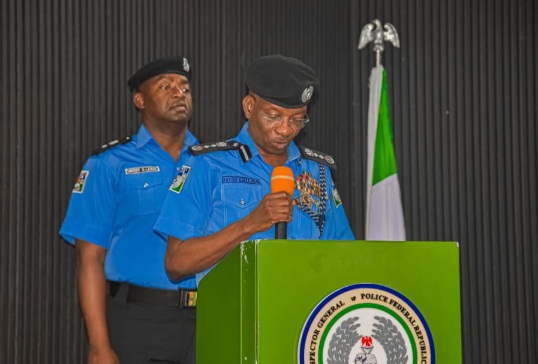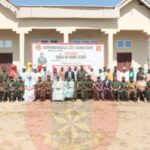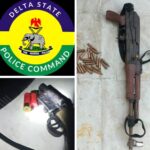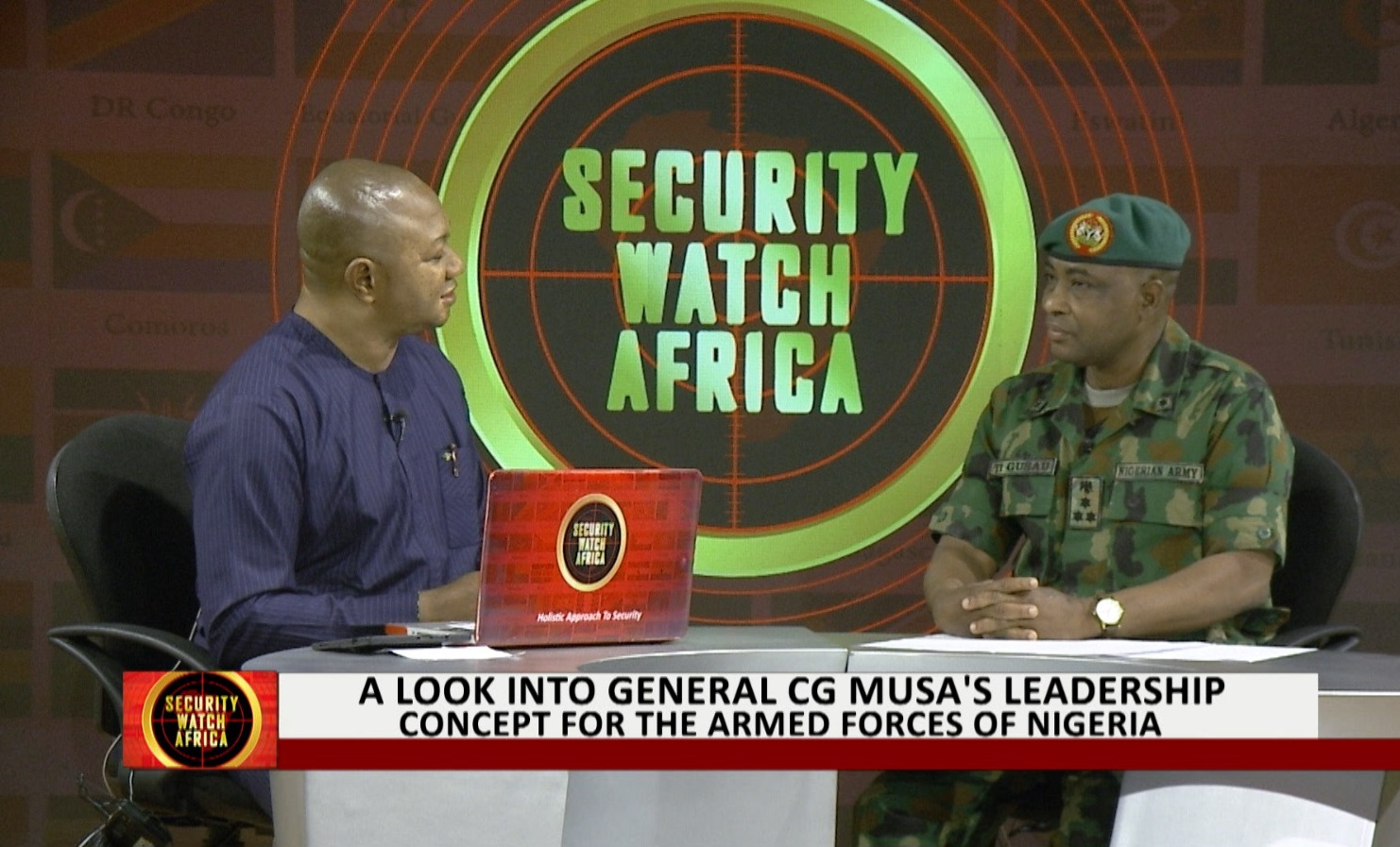By Augustine Ehikioya
Towards ensuring peace and security all round the country, the Inspector General of Police (IGP), Olukayode Egbetokun, has charged police officers to maintain higher standard of professionalism.
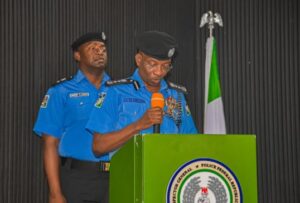
According to him, recent security situations in Niger, Kwara and Kebbi states have eroded the gains achieved.
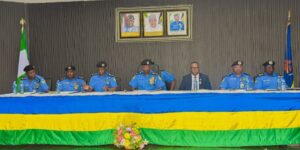


He spoke in Abuja on Thursday during Strategic Police Officers Conference. Security Watch Africa (SWA) was there.
He said “But as leaders, we must hold ourselves to a higher standard; we have no excuses. We will not relent until all our vulnerable communities are protected.
“Peace maintained in one location but violated in another is not peace. In the immediate, we are not sleeping, nor are we giving ourselves accolades until every pupil abducted in Niger State is rescued unharmed and reunited with their families.
“We have done it before, and we shall not retreat. In the Kwara and Kebbi incidents specifically, we immediately deployed adequate tactical assets and activated strong joint operations with sister security agencies, leading to the successful rescue of all victims unhurt.
“This coordinated outcome reflects what is possible when our systems work as they should, yet it also underscores how much more we must do to stay ahead of emerging threats,” the IGP stated.
He went on “While our collective efforts to maintain law and order across the country remain highly commendable, we must acknowledge that recent events have punctured the peace we have worked tirelessly to preserve.
“The ugly abduction of thirty-eight (38) worshippers in Christ Apostolic Church, Oke-Isegun, Eruku Community, Ekiti Local Government Area of Kwara State on 18th November, 2025, the abduction of twenty-five (25) school girls from Government Girls Comprehensive Secondary School, Maga Town, Danko/Wasagu Local Government Area of Kebbi State on 17th November, 2025;
“And the brazen attack on St Mary’s Catholic School, Papiri Community, Agwara Local Government Area, Niger State in the early hours of 21st November, 2025, all stand as grim reminders that a single breach anywhere is a disruption of peace everywhere in Nigeria.”
According to him, the Nigeria Police Force will continue to sustain intelligence-backed, inter-agency operations to contain and dismantle the activities of armed bandits, terrorists, kidnappers, and all violent threat actors operating in Nigeria.
The Force, he said, in collaboration with other security agencies were able to ensure the safe rescue of kidnapped victims and the successful reunion of those citizens with their families concerning the recent incidents recorded across Kebbi State and Kwara State.
“These outcomes reaffirm an important principle of modern policing and internal security management: crime is defeated fastest when response is unified, intelligence-driven, and operationally coordinated.
“This template of action must now be institutionalised as our standard. We have seen, more than ever before, that security agencies are aligning strategy, sharing intelligence, and synchronising operations at unprecedented levels and Nigerians are increasingly witnessing the results of this cooperation in real time.
“Therefore, I state firmly: there is no viable alternative to collaboration. Fragmented response creates opportunity for criminals, but unified response removes it,” he added.
To stay ahead of criminal strategy, he said that the Police must constantly re-evaluate, adapt, and innovate.
“It is now time to further reposition our operational approach, expand our intelligence reach, increase visibility, fortify soft targets, and restrategize proactively.
“I state clearly, these attacks are unacceptable, and our collective approach must shift firmly from reactive to proactive policing.
“Criminal elements must not only be intercepted, they must be out-maneuvered, dismantled, and decisively subdued through intelligence-led operations and sustained policing pressure.”
Stressing that the Nigeria Police Force is prepared and not retreating from the fight against insecurity, the IGP highlighted enhanced policing strategies for the Force to excel.
He said “We are advancing into it. And to win, we must implement stronger policing frameworks rooted in core fundamentals of modern law enforcement.
“Consequently, we shall emplace the following enhanced policing strategies to deepen territorial security dominance, protect vulnerable populations, strengthen criminal disruption cycles, and reinforce national safety during this critical season.”
Listing the enhanced strategies, he said “i. Operationalising a Strong Native Intelligence Network.
The fight against violent crime is won first in the field of intelligence. We must build systems that see crime before it erupts. I hereby direct all Commands and Commissioners of Police to deepen your intelligence frameworks beyond conventional reporting lines. A dependable native intelligence network is not built only on desk officers, it is built inside markets, transport unions, student leadership circles, farming clusters, health-care intelligence touchpoints, religious institutions, and trusted community observers who can lawfully relay behavioural shifts, unfamiliar movements, and threat signals.
“Local intelligence networks thrive when communities trust the police, therefore, their cultivation must be lawful, ethical, professional, and protected. Intelligence assets must be trained on confidentiality obligations and handled without exposure to political or social manipulation. As senior commanders, you must deploy Intelligence Response Cells that analyse local patterns, interpret pre-attack indicators, map crime migration corridors, and push intelligence to tactical patrol teams in actionable formats. Information without action is not intelligence, actionable information deployed ahead of crime is intelligence.
“This network must also integrate open-source intelligence awareness, forensic-enabled investigative tracking, rural informant engagement, cyber-intelligence monitoring of criminal brag trails, and tactical intelligence retrieval after every attack. Each major incident should generate an intelligence packet that predicts not just who attacked, but who may be next, where they may move, and how they may strike again. We must police forward, not backward.
“ii. Reinforcing and Empowering Community Policing Structures
Community policing is not ancillary to national security, it is foundational to it. Especially at this time where communities are no longer just witnesses to crime, but victims of coordinated assault. Commissioners must lead policing frameworks that structurally bind the police to grassroots influence networks; traditional rulers, town unions, local hunters, civil defence outfits, vigil groups, and youth organisations.
“Engaging community policing means building local shared-ownership of security, not delegating authority to non-police outfits. You must establish Joint Community Safety Forums, conduct Community Threat Profiling, institutionalise Local Crime Watch Desks, and build Village-Level Rapid Information Channels that signal the police before criminals fortify positions.
“This is how threats are squeezed, not by occupying only highways, but by occupying the confidence, cooperation, and communication channels inside the people’s spaces.
“When this system works, communities recover first from fear, then from crime. They feed information freely, respond to police direction willingly, grant operational legitimacy faster, and discourage criminals socially as much as they are discouraged tactically.”
According to him, terror cannot permanently live among a people who are united with the law enforcement system sworn to protect them.
“That is the psychology you must nurture in each State Command,” he stated.
Continuing on the strategies, the IGP said “iii. Massively Increasing Policing Visibility through Coordinated Patrol Systems
Criminals succeed most in environments where policing is sparse, irregular, or predictable. We must therefore flood the public space with lawful deterrence.
“Not symbolic visibility, but structured dominance of policing presence through layered foot patrols, highway confidence patrol convoys, community perimeter surveillance, and vehicular rapid response dragnets.
“Foot patrols should not be casual walks, they must be sector-mapped, timed, logged, and intelligence-guided.”
Commissioners, he said, must divide each command into Micro-Policing Sectors with assigned Patrol Commanders, deploy Night Confidence Patrol Teams into unprotected settlements, optimise patrol routes using Heat-Zone Movement Analytics, and log patrol visibility hours as a key performance metric.
“Citizens must see us more often than they currently see criminals.
Vehicular patrols must employ modern policing posture; vehicle surveillance teams, convoy-style rural confidence patrol squads, mobile checkpoints built on lawful search protocols, rapid pursuit units, and targeted patrols that disrupt criminal transit, supply chains, and escape routes.”
Visibility, according to him, denies criminals time, confidence, and consolidation, which he said must be relentless.
“iv. Building Deep, Action-Driven Partnerships with Sister Security Agencies
Security rivalry helps crime, security synergy breaks it. Commissioners must therefore operationalise real partnerships not ceremonial alliances. Joint tactical patrols, shared intelligence briefings, operations backed by military cover when required, inter-agency radios in high-threat States, joint map-based operational planning, and unified response architectures that deny criminals inter-service loopholes.
“You must lead Monthly Intelligence Roundtables between State security authorities, establish Joint Tactical Operations Plans after every major attack, deploy Joint Route-Domination Patrols with the Nigerian Armed Forces, integrate strategic information exchange with the Nigeria Security and Civil Defence Corps, and expand lawful border-crime tracking strategies especially in frontier states like Kebbi, Niger, Sokoto and neighbouring security theatres.
“These partnerships do more than increase manpower, they increase authority of response, operational cover, cross-verification of intelligence, wider surveillance capture, and logistical burden sharing.
“Criminals cannot overrun a system that closes ranks against them,” he said.
The IGP maintained that the methods highlighted are not mere protocols, but proven policing fundamentals.
“When properly deployed, they bolster deterrence, improve response times, provide communities psychological relief, disrupt criminal planning cycles, and lead to higher operational success rates.
“Nigeria wins when the Police works ahead of crime rather than behind it. Our strategic success also lies in unity of action. We must sustain the ongoing partnerships.”
He also warned that the audits should not be academic exercises; but must translate into deployment outcomes.
“Strengthen perimeters. Increase policing presence. Deploy anti-attack intelligence channels. Assign intelligence officers for early-warning detection. Re-engineer local safety partnership frameworks with school principals, proprietors, religious leaders, faith institutions, youth watchdog councils, and township defence committees to ensure free flow of threat signals directly into Tactical Police Response cells,” he added.
The IGP explained that the recent Presidential directive on the withdrawal of police personnel deployed for VIP protection is a strategic and deliberate realignment of national policing priorities.
“This policy decision is rooted not in sentiment, but in necessity reflecting the current security demands of our nation and reinforcing the fundamental purpose for which this Force exists: the protection of our people, the defence of our communities, and the safeguarding of public order.
“It is important to emphasise that this action is a patriotic, forward-looking, and operationally prudent measure designed to strengthen our manpower capacity for critical frontline policing functions.
“Simply put, this policy ensures that more officers are repositioned from personalised security duties to collective public protection responsibilities, where their presence and operational impact are most urgently required.”
Following the announcement, the IGP said that a total of 11,566 personnel have been recalled and will be deployed to active policing duties.
Since the last meeting with the officers, he said the Nigeria Police Force has achieved notable operational outcomes across strategic formations and tactical response structures.
He listed the achievements to include “Arrests: A total of eight thousand, two hundred and two (8,202) suspects were arrested for various offences. Including Four hundred and fifty-one (451) armed robbery suspects, three hundred and fifty-six (356) kidnapping suspects, five hundred and thirty-four (534) murder/culpable homicide suspects, one hundred and seventy-three (173) persons for unlawful possession of firearms, three hundred and twelve (312) suspected rapists, two hundred and eighty-two (382) suspected cultists were all arrested, while six thousand, and ninety-four (6,095) suspected persons were arrested for other serious offences.
“Firearms and Ammunition Recovery: two hundred and forty-nine (249) assorted firearms and twenty thousand, nine hundred and eighty-nine (2,989) different calibres of ammunition were recovered.
Vehicles Recovered: Two hundred and thirty-eight (238) different models of vehicles were recovered.
“Kidnap Victims Rescued: two hundred and thirty-two (232) victims of kidnapping were rescued.” he stated
As Nigerians approach the festive season, he charged the officers to ensure the roads are decisively dominated by visibility policing and preparedness to stem criminals’ exploitation.
“I hereby charge each State Command to activate Festive Deployment and Visibility Plans. These should include expanded Highway Patrol teams, reinforced foot-patrol units at motor parks, anti-robbery dragnet patrols on high-traffic roads, intelligence-backed vehicular patrol fleets for rural corridors, and inter-service collaboration patrols to guarantee route safety across all national highways, border access roads, township entry-exit routes, market transit belts, and community travel corridors.
“Employ the use of Artificial Intelligence (AI) in your policing strategies, including the use of drones and other technical assets. Every Command must log visibility hours and ground presence stretches as performance metrics for December deployment returns.
“Let this festive period be defined by public safety, policing dominance, citizen confidence, and crime suppression — not fear,” he stated.
The IGP thanked President Bola Tinubu for his consistent leadership, strategic guidance, and unwavering support to the Nigeria Police Force.



